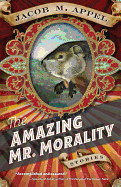
Every one of the short stories in Jacob M. Appel's The Amazing Mr. Morality hinges on a choice, most often ethical. The first story, "The Children's Lottery," follows a terrifying selection process where children are chosen to live with pedophiles while their teachers look on helplessly. In the titular novella, a young doctor rediscovers the man who abused him and his mother during childhood, and has the chance for revenge. And in the most tragic story, "Right of Way," a squabble over renaming a street forces a tween to face what he owes his hometown and his family.
Each time, the main character is called to choose, sometimes with obvious ramifications. What makes The Amazing Mr. Morality so delectable is that these characters rarely make the "right" choice. The stories collected here aren't morality plays, with Appel serving judgment on his character's actions through the resolutions to his tales (though a couple of them might get served with poetic justice). Instead, the author is interested in watching the ripple effects of when everyday people break bad: What are the unforeseen consequences for the health of a community when one person decides to stray from the common good? That's where these stories get interesting, especially "Right of Way," the standout story and one which most rigorously follows Appel's ethical experiments to their logical conclusion. The wrongdoers aren't always punished (or rewarded), but someone around them is. --Noah Cruickshank, adult engagement manager, the Field Museum, Chicago, Ill.

